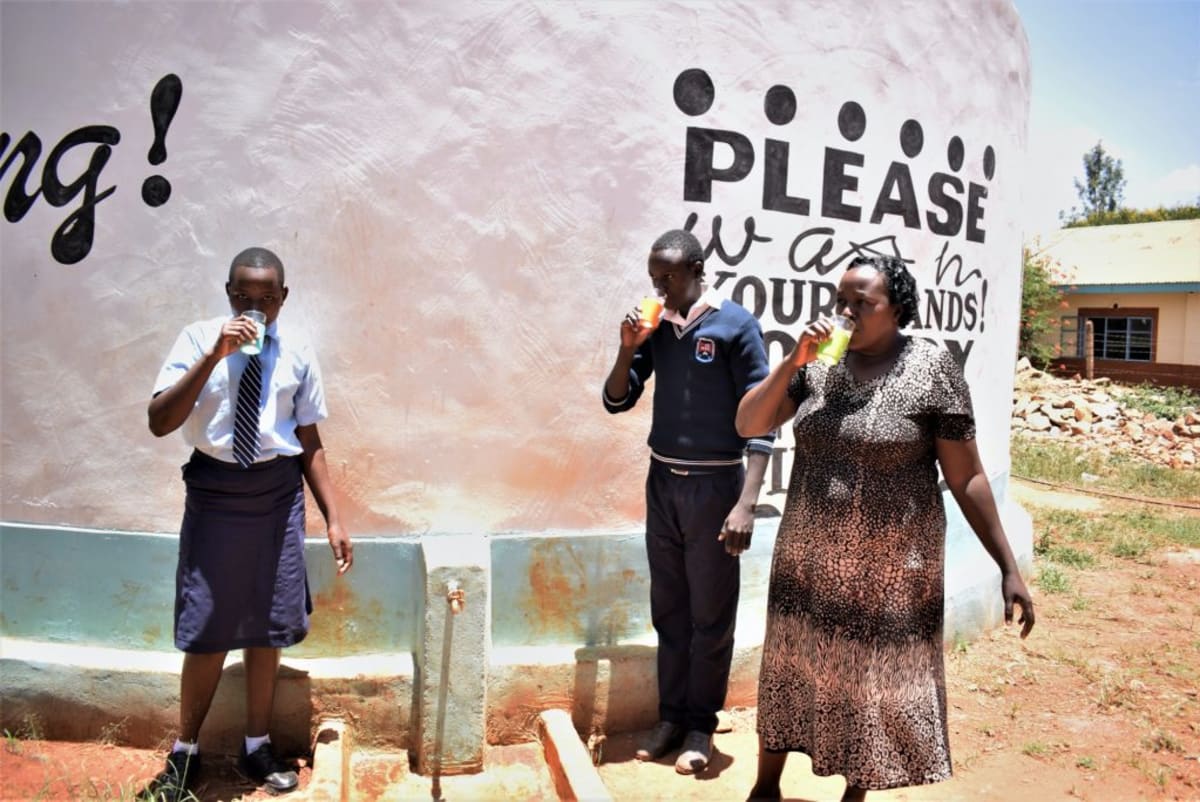This area of Mbuuni is hilly, vegetated, and peaceful - a conducive learning environment for students at Mbuuni Secondary School. River Thwake cuts the village in half, snaking through these hills. People living here used to specialize in growing coffee, but it's no longer as profitable.
Mbuuni Secondary School was opened by the community in 2004, and continues thanks to parents' strong support. It has seven classrooms, a kitchen, girls' dormitory, and latrines. There are 217 students enrolled, of which 67 girls stay in the dormitory overnight. The school employs 10 teachers and six support staff.
Boarders wake up at 5am to get ready for morning study hall. Other students arrive at 6am to join the boarders for study hall before the normal day of classes begins.
Water
The school is connected to the Mbuuni water pipeline, but it's unreliable. No water came out of the tap during our visit. It only works a few days a week, school administration staff shared with us. There are two plastic tanks on school grounds that are hooked up to this pipeline. The school fills them up with as much water they can afford whenever the taps are running.
So for most of the week, students are sent out with staff to buy water from a community borehole. This pump breaks down often, and students say that there's some stiff competition between them and the community members; community members assert that a borehole located in their area should serve themselves first with the students' needs secondary.
"Students waste a lot of time walking to the borehole to fetch water. Buying water is expensive to this young school whose parents struggle with fee payment. The borehole even dries up, and the pipeline is prone to breakages too," Deputy Principal Wambua told us.
Sanitation
There are six latrines for each gender. The structures are in good shape, but they are not clean at all. This is because the school doesn't have the water to spare for cleaning.
Deputy Principal Wambua admitted that "the school is struggling to keep high levels of hygiene and sanitation, but the lack of enough water derails our efforts."
There are no handwashing stations, not even for the girls who live at the school full time. The scene inside the kitchen was also discomforting, and we couldn't find a counter or dish rack for keeping utensils and dishes up off the ground.
Here’s what we’re going to do about it:
Training
Students and staff will be trained on hygiene and sanitation. Those in attendance will form a school health club that will promote good hygiene and sanitation practices both at school and at home. They will learn all the steps of proper hand-washing, how to treat water, and how to keep their environment clean. The school will also be taught how to best oversee and maintain their new rainwater catchment tank and hand-washing stations.
Hand-Washing Stations
Three hand-washing stations will be delivered at the project’s completion. These are 1,000-liter plastic tanks fitted with four taps. The health club and school management will be responsible for making sure tanks are filled with water and that a cleaning agent such as soap or ash is available.
Rainwater Catchment Tank
We will build a 104,000-liter rainwater catchment tank for this school. Its clean water will benefit the students, teachers, and supplementary staff. Parents will mobilize the materials needed for construction, such as sand and stone and also lend some strong arms to help with the actual construction.
As soon as the tank has time to cure, it can begin to collect rainwater for drinking, cooking and cleaning! 104,000 liters of water will keep students and staff in class and focusing on learning.
This project is a part of our shared program with Africa Sand Dam Foundation. Our team is pleased to provide the reports for this project (formatted and edited for readability) thanks to the hard work of our friends in Kenya.



 Rehabilitation Project
Rehabilitation Project































